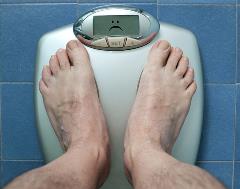Endocrinology
Endocrinology Services
If you have diabetes, or think you may have diabetes, DMC can help you find a primary care physician who can help you.
Educational and other Support Groups for Diabetes Care.
Common Disorders of the Endocrine System.
When your thyroid causes problems, there are different ways your primary care physician or endocrinologist will test you...
Seven Signs You May Have Diabetes
 Data from the Centers for Disease Control and Prevention (CDC) says that of the estimated 30.3 million Americans who are living with type 2 diabetes, 7.2 million, or one in four adults living with the disease don’t even know they have it. That’s a surprising number of people who are not taking care of their symptoms and preventing further damage, simply because they are not aware of it.
Data from the Centers for Disease Control and Prevention (CDC) says that of the estimated 30.3 million Americans who are living with type 2 diabetes, 7.2 million, or one in four adults living with the disease don’t even know they have it. That’s a surprising number of people who are not taking care of their symptoms and preventing further damage, simply because they are not aware of it.
There are some obvious (and not-so-obvious) signs, so if you think you may be at risk, talk to your doctor. You can help assess your chances of developing type 2 diabetes by requesting an A1C test from your doctor. An A1C test is a blood test that reflects your average blood glucose levels over the past three months.
Learn about your family’s health history, as your genetics may also have a hand in your risk for diabetes. Some risk factors include:
- Obesity
- 45 years old or older
- Family history of diabetes
- African-American, Alaska Native, American Indian, Asian-American, Hispanic/Latino, Native Hawaiian or Pacific Islander
- Sedentary lifestyle
- History of heart disease or stroke
- Depression
- Have polycystic ovary syndrome, also called PCOS
If you think you may be one of the 7.2 million adults who has diabetes and doesn’t know it, you need to know the signs.
Seven Signs You Could Have Diabetes
- Excessive Urination
When there is excess glucose present in the blood, as with type 2 diabetes, the kidneys react by flushing it out of the blood and into the urine. People with type 2 diabetes are also twice as likely to get a UTI as people without the disease, and the risk is higher in women than in men.
- Increased Thirst or a Dry Mouth
High blood sugar leads to increased production of urine and the need to urinate more often. Frequent urination causes you to lose a lot of fluid and become dehydrated, so in order to make up for that loss, your body signals thirst so you’ll rehydrate. If you’re drinking more often than usual, that could be a telltale sign.
- Unexpected Weight Loss
When you have type 2 diabetes, your cells don't get enough glucose, which may cause you to lose weight.
- You Feel Hungry All The Time
People with type 2 diabetes have insulin resistance, which means the body cannot use insulin properly to help glucose get into the cells. In people with type 2 diabetes, insulin doesn’t work well in muscle, fat and other tissues, so your pancreas (the organ that makes insulin) starts to put out a lot more of it to try and compensate. This insulin level sends signals to the brain that your body is hungry.
- Foot Pain and Numbness
Over time, a prolonged exposure to high blood sugar can damage the nerves throughout the body, resulting in diabetic neuropathy.
- Frequent Infections and Feminine Health Issues
Because both yeast and bacteria multiply more quickly when blood sugar levels are elevated, women with diabetes are overall at a higher risk of feminine health issues, such as bacterial infections, yeast infections and vaginal thrush, especially when blood sugar isn't well controlled.
- Blurred Vision Could Be a Result of Rapid Blood Sugar Changes
Blurred vision occurs when there are rapid changes in blood sugar — from low to high or high to low — and the eye muscles have not yet adapted to it. Blurred vision is one of the early warning signs of type 2 diabetes. The body later adapts to the sugar levels, and your vision will go back to normal.
It’s important that you take care of yourself. Some adults with type 2 diabetes are able to reverse the damage and actually ease up on their medication simply through weight loss and watching their sugar intake.


